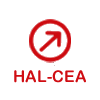Eikonal gradient-enhanced regularization of anisotropic second-order tensorial continuum damage models for quasi-brittle materials
Résumé
Continuum damage models are often employed to represent cracking in quasi-brittle materials (e.g., concrete, masonry and some rocks). From a numerical perspective, these models yield mesh-dependent results at the structural scale without regularization. Standard regularization techniques are prone, however, to some well-known drawbacks. To address these limitations, non-local models with evolving interactions have been proposed. Inspired by the analogy between non-local interactions and wave propagation time in a damaged domain, the eikonal non-local regularization introduces evolving non-local interactions through a damage-dependent metric field. The contribution of the paper involves coupling for the first time the gradient-enhanced version of the eikonal non-local formulation with a second-order anisotropic damage constitutive model. Such an aspect is essential when modeling quasi-brittle materials, since the material response is anisotropic and associated with various well-established behaviors, including the dissymmetry between tension and compression and unilateral effect. The manuscript provides a detailed overview of the formulation, numerical solution methods, and test cases, demonstrating some important features of these models. Attention is focused not only on the regularization properties of the formulation but also on its capability to naturally represent the transition from damage to fracture.
| Origine | Fichiers produits par l'(les) auteur(s) |
|---|


